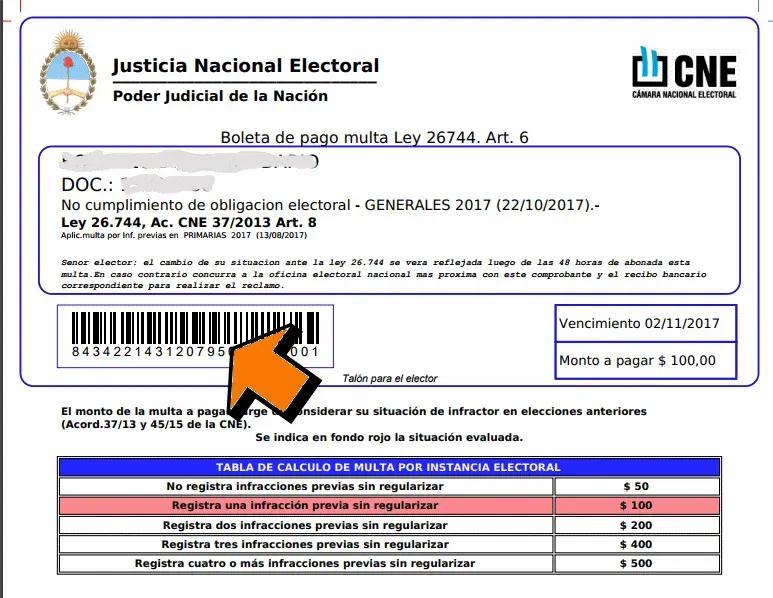The obligation to vote in Argentina is a fundamental pillar of its democratic system. However, the lack of participation at the polls can lead to penalties that generate intense debate over the effectiveness and fairness of such measures. In this article, we will explore the nature of the fine for not voting, its application, and its implications for citizen participation.
📊 Current Overview
In Argentina, voting is mandatory, and the law establishes fines for those who do not show up to vote without a valid justification. According to current regulations, those who do not attend elections may face a fine that varies depending on the individual's income and the electoral context. In the case of the elections on October 26, the penalties can be significant, which has led to increased interest in how to regularize one's situation with the National Voter Registry. This punitive approach, as discussed on various platforms, seeks not only to encourage participation but also to maintain the integrity of the democratic process.
One aspect to consider is that, although the law establishes the obligation to vote, the level of participation in elections has fluctuated in recent years. For example, in the 2019 general elections, participation was 81%, while in the 2021 primaries it dropped to 68%. This trend suggests that the fine, although deterrent, is not the only factor influencing a citizen's decision to go to the polls.
🌍 International Comparison
The issue of mandatory voting and fines for non-participation is not exclusive to Argentina. Countries like Australia and Belgium also implement similar systems. In Australia, the law requires that all registered citizens vote, and penalties are established for those who do not. The fine for not voting in Australia can rise to $20 AUD, a relatively low figure compared to Argentine sanctions.
In Belgium, the system is stricter, where failing to attend elections can result in a fine of up to 200 euros. Moreover, in both countries, it is observed that the implementation of these measures has managed to maintain participation levels around 90%. This comparison indicates that, while penalties can be effective in increasing participation, it is essential that they are accompanied by actions that promote civic culture and political education.
⚖️ Social and Political Implications
Fines for not voting have multiple implications that go beyond the economic penalty. Firstly, the ethical dilemma arises of whether it is right to impose a penalty on citizens for not exercising a right that should be voluntary. This aspect has been the subject of debate, as some argue that coercion can create resentment towards the democratic system, rather than fostering active participation.
Additionally, the implementation of these fines may disproportionately impact the most vulnerable sectors of the population. Those with limited incomes may view the fine as an additional obstacle that prevents them from participating in the electoral process. This, in turn, could contribute to unequal representation in political decisions, perpetuating a cycle of exclusion.
On the other hand, it is important to consider that the debate over the obligation to vote and sanctions is not limited to Argentina. In many countries, similar discussions have taken place, suggesting that electoral participation is a universal issue that merits attention. The experiences of other countries can offer valuable lessons on how to design policies that encourage participation without resorting to punitive measures.
💡 Proposals for Greater Participation
To address the issues related to the fine for not voting, it is crucial to consider alternative strategies that can incentivize citizen participation without resorting to coercion. Some proposals include:
1. Civic Education: Implement civic education programs in schools and communities that inform about the importance of voting and the impact of participation on democracy.
2. Facilitating the Electoral Process: Improve accessibility to polling centers, including extended hours and options for early or mail-in voting for those unable to vote on election day.
3. A Awareness Campaigns: Conduct campaigns that promote the value of voting, highlighting stories of individuals whose rights have been benefited by electoral participation.
4. Positive Incentives: Offer incentives to voters, such as discounts on services or products, instead of fines, to motivate attendance at the polls.
🏛️ Conclusions
The fine for not voting in Argentina is an issue that requires deep and balanced analysis. While the obligation to vote is grounded in the need for an active democracy, penalties can have adverse effects on citizens' perception and participation. As the country prepares for the upcoming elections, it is vital to reflect on how to foster a civic culture that prioritizes voluntary and conscious participation over coercion.
Ultimately, the goal should not only be to increase electoral participation figures but also to strengthen trust in institutions and civic commitment among citizens. Democracy thrives on participation, and it is the responsibility of all involved actors to create an environment that supports it.

Comments